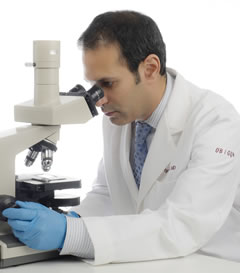Conditions We Treat
Lichen Planus (LP)
Lichen Planus is an inflammatory condition which affects the skin, nails and mucous membranes. Although the condition is not common, when it does occur, a women may notice a generalized skin rash, or alternatively the outbreak may simply be limited to the vulva. Its exact cause in unknown, but it likely involves an autoimmune response.
Who is most likely affected?
Women in their 50s and 60s
Women with other autoimmune diseases
- severe vulvar itching
- intense vulvar pain
- vulvar soreness
- vulvar burning
- an uncomfortable vaginal discharge, not responsive to standard treatments
- pain with intercourse, and occasionally bleeding after intercourse
There are three types of Lichen Planus (LP) that affect the vulva:
Erosive LP: This is the most common type and can also affect the vagina in addition to the vulva. As such, women with this type of LP are more likely to notice bleeding with intercourse and an increased vaginal discharge. In its most severe form, Erosive LP can form scarring which can lead to narrowing of the vagina. This is what leads to pain with intercourse, and possibly pain and/or difficulty with urination. Unfortunately, this type of LP tends to be slow healing and is associated with recurrent outbreaks.
Papulosquamous LP: This is a less common type but is intensely itchy and can cause rash-like bumps and symptoms in the skin around the anus. Darkening of the skin in affected areas is common after the outbreak has resolved. Hypertrophic LP: This is rare and requires a biopsy for accurate diagnosis. It causes thick, rough lesions on the anogenital region.
To accurately diagnose Lichen Planus in any of its three forms, a thorough medical history needs to be obtained, and the patient must have the typical findings on a physical exam. The diagnosis can sometimes be made by history and examination alone, however, a biopsy is usually recommended to confirm the diagnosis.
Treatment of the three subtypes of Lichen Planus is similar in that they are recognized as chronic conditions that will involve specialized attention with close and persistent follow-up. Therapy is handled in a four pronged approach: patient education, behavior modification, patient support, and medication. The physician must explain that Lichen Planus is a chronic condition, and although amenable to treatment, will need continued care. Good vulvar hygiene is necessary for treatment to be effective. Emotional support must be provided to the patient to reassure her that this chronic condition can be controlled. And finally, medications in the form of topical steroids will complete the treatment process.
Treatment and prognosis for Lichen Planus, although chronic, is quite promising. 95% of patients with Lichen Planus have at least good or partial response to initial treatment. Unfortunately, if scarring occurs prior to treatment it is not reversible. And without treatment, some believe there is a slight increased risk of vulvar malignancy, but this has not been confirmed in large studies.

